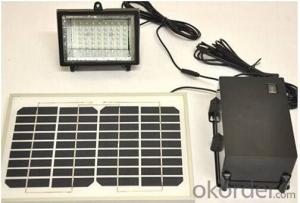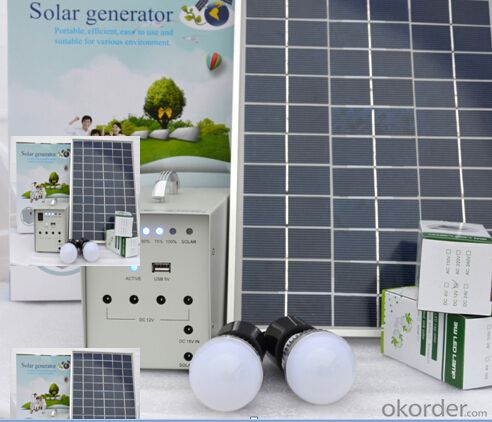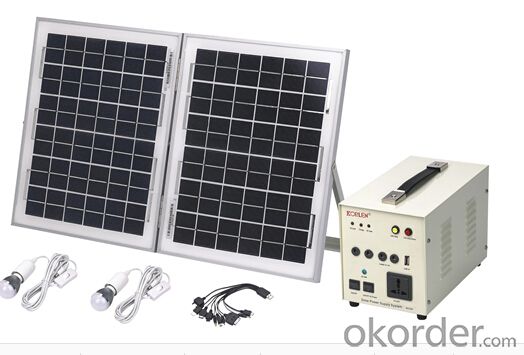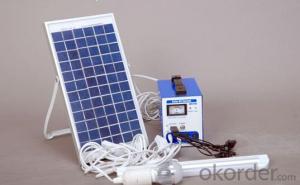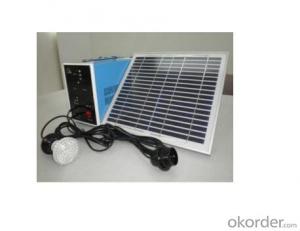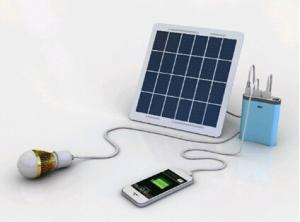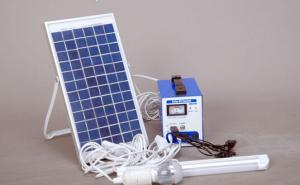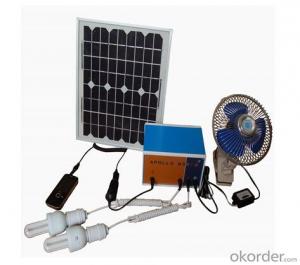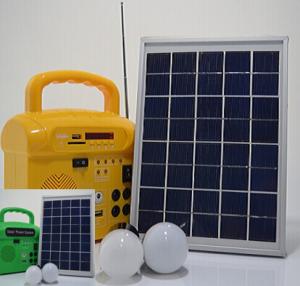Solar Energy Systems Fort Wayne - CNBM Solar Home System Roof System Capacity-25W-3
- Loading Port:
- Shanghai
- Payment Terms:
- TT or LC
- Min Order Qty:
- 10 set
- Supply Capability:
- 30000 set/month
OKorder Service Pledge
OKorder Financial Service
You Might Also Like
Introduction of Solar Home System
Solar Home System is composed by Solar Panels, Inverters, Charger Controller, Battery, Cable, Mounting Bracket, which is applied to produce electricity for home use.
Solar Home System is quite suitable product in urban area and the place which is short of electricity. Our Small Solar Home System own great benifits compare with other kind electricity resources:
Electricity generating cost of Solar Home System is much cheaper than diesel engine. Beside low electricity making cost, solar system products also have the features of noiseless, clean energy, environmentally friendly and can access to many different electric appliance.
Working Principle of Solar Home System
The stand alone Solar Home System is an off-grid solar system which uses batteries to store the solar energy. Stand alone solar system solutions design for those who are not able or willing to connect to electricity grid.
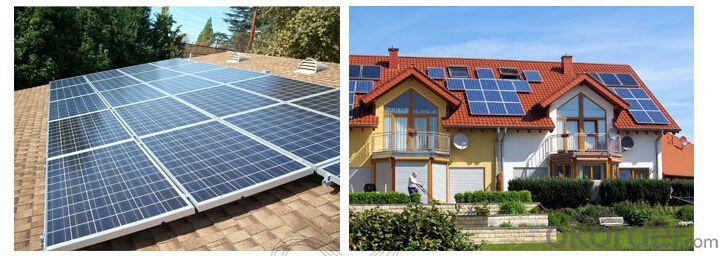


Terms and Conditions
1. Trade terms: FOB Shanghai
2. Payment terms: 30% T/T, balanced before shipment/ LC at sight before shipment. Actual Terms can be negotiated for big order.
3. Package: Exported standard package suitable for tough handling and sea transport.
4. Delivery: Goods to be ready within 10~30 days depending on order quantity.
5. Warranty: 10 years for solar panel, 2 years for controller/inverter/battery.
FAQ
Q: Required mainly certificates (CE&IEC/TUV/RoHS)?
A: Our products are certificated by CE RoHS, IEC, ISO, TUV, UL etc.
- Q: Is solar energy reliable?
- Yes, solar energy is reliable. It is a renewable energy source that harnesses the power of the sun, which is a constant and abundant source of energy. With advancements in technology, solar panels have become more efficient and dependable, making solar energy a reliable and sustainable option for generating electricity.
- Q: What is the role of solar energy forecasting in grid integration?
- The role of solar energy forecasting in grid integration is vital for effectively managing the integration of solar power into the electrical grid. Solar energy forecasting provides accurate predictions of solar power generation, enabling grid operators and energy market participants to plan and optimize the operation of the grid. Solar energy is intermittent and variable, as it depends on weather conditions and the position of the sun. Therefore, accurate forecasting of solar power generation helps grid operators to anticipate fluctuations in solar energy supply and plan for potential imbalances between supply and demand. Grid integration of solar energy requires balancing the variability of solar power generation with the overall electricity demand. Solar energy forecasting plays a critical role in this process by providing real-time predictions of solar output, allowing grid operators to adjust other sources of power generation or storage to maintain grid stability. Moreover, solar energy forecasting is essential for the effective utilization of solar power in energy markets. Accurate forecasts enable energy market participants to optimize their trading strategies, determine the optimal dispatch of power generation assets, and manage their portfolio effectively. This helps to reduce the cost of integrating solar energy into the grid and enhances the overall economics of renewable energy. Additionally, solar energy forecasting contributes to the efficient operation of grid infrastructure. By providing accurate predictions of solar power generation, grid operators can plan the deployment and operation of transmission and distribution infrastructure, ensuring that it can handle the increasing penetration of solar energy without compromising grid reliability. Overall, solar energy forecasting plays a crucial role in grid integration by providing accurate predictions of solar power generation, allowing grid operators and energy market participants to effectively manage the integration of solar energy into the electrical grid, optimize energy trading strategies, maintain grid stability, and efficiently operate grid infrastructure.
- Q: What is the system voltage of solar panels
- Solar panels are the most basic components of photovoltaic power generation systems and products. Its main role is to convert solar energy into electricity stored in batteries.
- Q: Are solar panels weather resistant?
- Yes, solar panels are weather resistant. They are designed to withstand various weather conditions, including rain, snow, hail, and high winds. The materials used in their construction are durable and can handle exposure to the elements for many years. Additionally, solar panels are often installed at an angle to allow for self-cleaning and minimize the accumulation of dirt and debris, further enhancing their weather resistance.
- Q: Can solar energy systems be used in powering shopping malls or retail centers?
- Absolutely, shopping malls or retail centers can definitely utilize solar energy systems to generate power. Solar power has gained immense popularity and cost-effectiveness in recent years, making it a viable choice for commercial establishments. The extensive rooftops and parking lots of shopping malls provide ample space for the installation of solar panels, which can produce a substantial amount of electricity to fulfill the energy requirements of these facilities. By employing solar energy systems, shopping malls and retail centers can diminish their reliance on the grid and eventually lower their energy expenses. By utilizing solar power, these establishments can save on their electricity bills and allocate these savings towards other operational expenses or improvements. Furthermore, the installation of solar panels in shopping malls and retail centers can also enhance their sustainability and environmental credentials. As renewable energy sources, solar systems generate clean electricity without emitting greenhouse gases or pollutants. By transitioning to solar power, these establishments can significantly decrease their carbon footprint and make a positive contribution to the battle against climate change. Moreover, solar panels can serve as a visible demonstration of a mall's commitment to sustainability, attracting environmentally conscious customers who prioritize shopping at eco-friendly establishments. This has the potential to increase foot traffic and revenue for these retail centers. In conclusion, shopping malls and retail centers can undoubtedly make use of solar energy systems to power their operations. By harnessing the sun's power, these establishments can reduce their energy costs, enhance their environmental sustainability, and appeal to customers who value eco-friendly shopping experiences.
- Q: Can solar panels be installed on vertical surfaces?
- Yes, solar panels can be installed on vertical surfaces. While they are most commonly installed on rooftops or ground-mounted systems angled towards the sun, advancements in technology have made it possible to mount solar panels on vertical surfaces such as walls or fences. These vertical installations are known as building-integrated photovoltaics (BIPV) and can be an effective way to generate solar energy in areas with limited horizontal space.
- Q: What is the role of tracking systems in solar energy systems?
- The role of tracking systems in solar energy systems is to optimize the collection of sunlight by continuously adjusting the position of solar panels to maximize their exposure to the sun. Tracking systems help solar panels follow the sun's movement throughout the day, enabling them to capture the maximum amount of solar energy and generate more electricity. This enhances the overall efficiency and output of the solar energy system.
- Q: What is the role of microinverters in a solar energy system?
- Microinverters play a crucial role in a solar energy system as they convert the direct current (DC) produced by individual solar panels into alternating current (AC) that can be used to power homes and businesses. Unlike traditional string inverters, microinverters are installed on each panel, allowing for better energy production and system performance, even in shaded or partially shaded areas. Additionally, microinverters enable real-time monitoring of each panel's performance, simplifying maintenance and troubleshooting processes.
- Q: How do solar energy systems impact the quality of air and water?
- The quality of air and water is positively affected by solar energy systems. Unlike coal or gas, which are traditional energy sources, solar energy does not release harmful emissions or pollutants, resulting in a significant decrease in air pollution. This not only enhances air quality but also aids in reducing the greenhouse gas emissions that contribute to climate change. Solar energy systems also have a minimal impact on water quality. Although some water is utilized during the manufacturing process of solar panels, the quantity used is considerably lower compared to other energy sources like fossil fuels. Furthermore, solar energy does not require water for its operation, unlike thermal power plants that consume large amounts of water for cooling purposes. Additionally, the use of solar energy diminishes reliance on fossil fuels, which are often obtained through environmentally destructive methods such as fracking or oil spills. Shifting to solar energy significantly reduces the risk of water contamination resulting from these activities. Moreover, solar energy systems contribute to the conservation of water resources. Traditional energy sources like coal or gas power plants necessitate substantial amounts of water for operation, which can strain local water supplies and ecosystems. On the other hand, solar energy generation does not require water, thus aiding in the conservation of water resources and alleviating stress on aquatic ecosystems. In conclusion, solar energy systems have a positive impact on both air and water quality. They aid in reducing air pollution, greenhouse gas emissions, and the risk of water contamination, while also conserving water resources. By embracing solar energy, we can advocate for a cleaner and healthier environment for future generations.
- Q: Can a solar energy system be installed on a residential apartment complex?
- Yes, a solar energy system can be installed on a residential apartment complex. In fact, many apartment complexes have successfully implemented solar panels to generate clean and renewable energy for their residents.
Send your message to us
Solar Energy Systems Fort Wayne - CNBM Solar Home System Roof System Capacity-25W-3
- Loading Port:
- Shanghai
- Payment Terms:
- TT or LC
- Min Order Qty:
- 10 set
- Supply Capability:
- 30000 set/month
OKorder Service Pledge
OKorder Financial Service
Similar products
Hot products
Hot Searches
Related keywords
